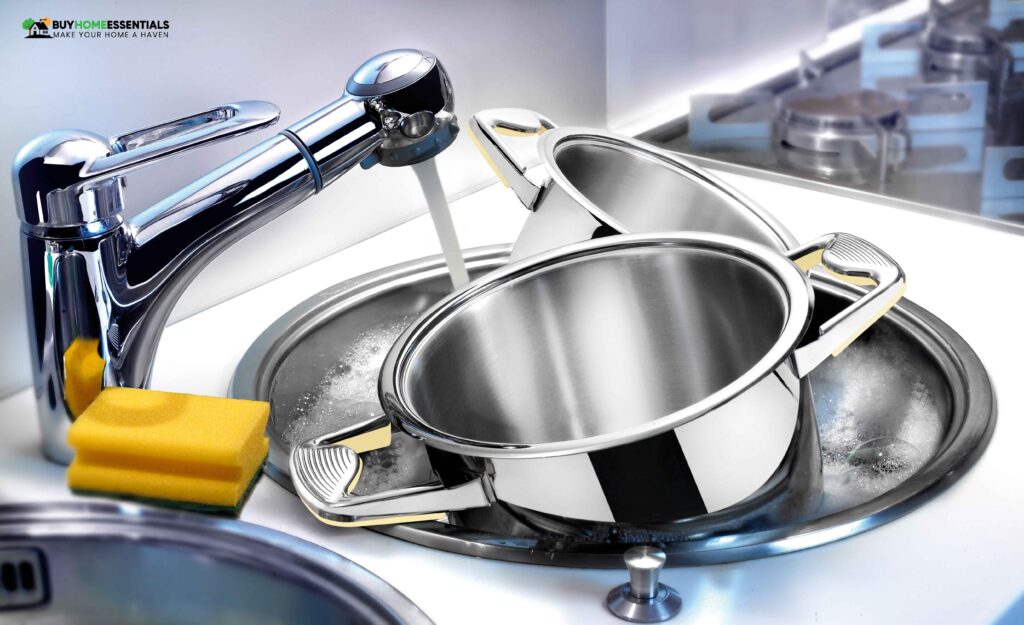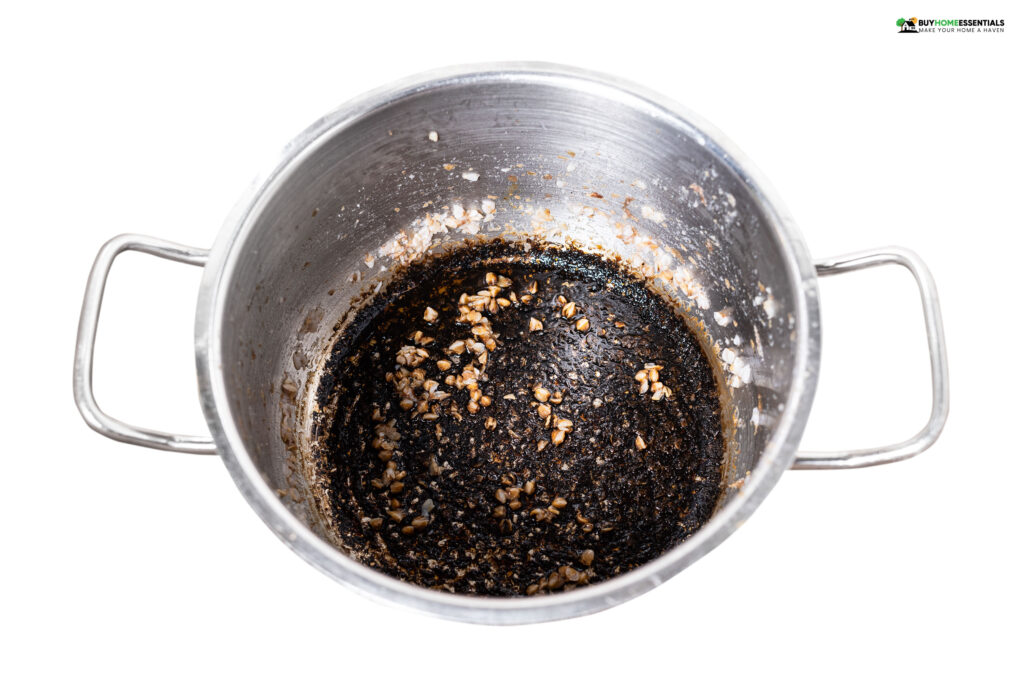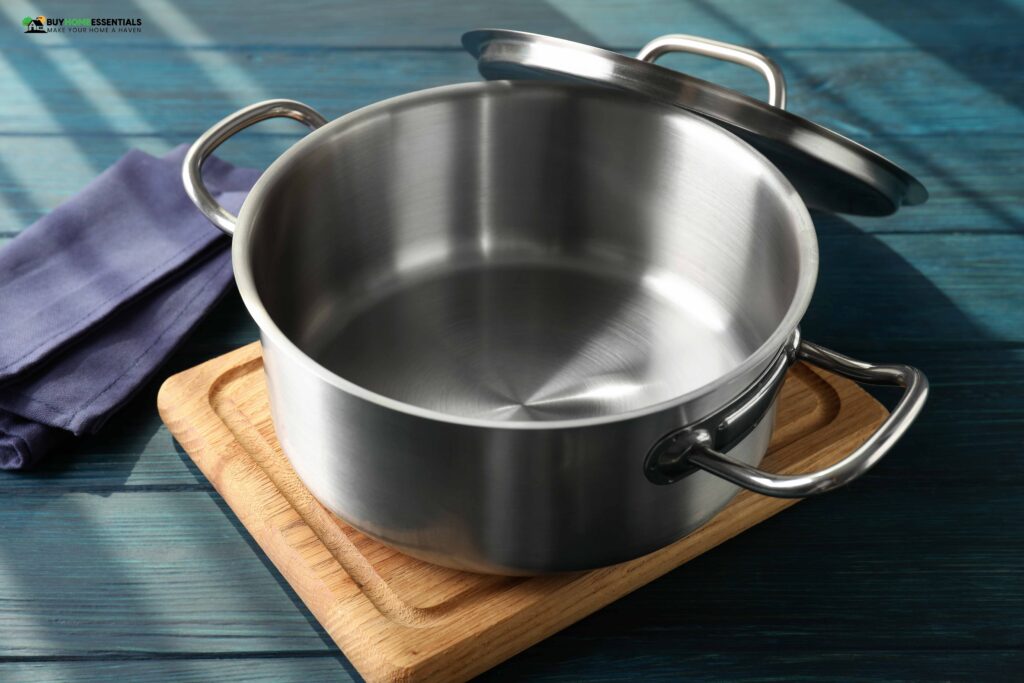Cooking with a pristine stainless steel pan will ensure a delicious experience. Do you want to know how to clean stainless steel pan to ensure they are pristine? In addition to aesthetics, a freshly cleaned pan is crucial for long-term functionality and durability.
Over time, stainless steel pans accumulate residues, stains, and a dull appearance. No worries! This comprehensive guide will show you how to clean stainless steel pan, bringing back its shine and extending its life. You can get gleaming, spotless stainless steel pans with suitable methods and a little effort. Let’s dive.
How to Clean Stainless Steel Pan: 7 Steps

How do you clean stainless steel pans? Follow the step-by-step instructions below.
Step 1: Cool Down and Remove Excess Food
When you have finished cooking, let the pan cool down. If there are any food residues or leftovers, remove them with a spatula or paper towel. When the pan is cool enough to touch, you should start cleaning it.
Step 2: Use Warm Soapy Water
Pour warm water into the stainless steel pan and add a few drops of mild dish soap. The warm water helps to loosen food particles and grease.
Step 3: Soak and Scrub
Soak the pan in warm, soapy water for 5-10 minutes. As a result of this soaking time, any remaining food bits become softer, making it easier to clean. Using a non-abrasive sponge or soft-bristled brush, gently scrub the pan after soaking.
Step 4: Pay Attention to Burnt Areas
You can make a paste to remove stubborn or burnt-on food using baking soda and water. Allow the paste to sit for a few minutes on the affected areas of the pan. Using a soft sponge or cloth, scrub the affected areas. As a mild abrasive, baking soda helps lift harsh residues.
Step 5: Rinse Thoroughly
Rinse the pan thoroughly with warm water to remove all soap residue. Remove any baking soda residue from the pan.
Step 6: Dry Completely
Dry the pan thoroughly with a towel after you have rinsed it. Allow the pan to air dry completely if possible.
Step 7: Optional – Polish the Surface
You can optionally polish the stainless steel pan’s surface to add more shine. You can polish the pan’s surface with a stainless steel cleaner or olive oil. It helps to remove streaks from the pan and enhances its appearance.
Following these steps regularly will make your stainless steel pan look great and stay clean.
How to Clean a Burnt Stainless Steel Pan

The following step-by-step guide will help you clean burnt stainless steel pan.
Step 1: Assess the Damage
The first step is to assess the extent of the burnt food in the stainless steel pan. Determine whether the burn is mild or severe. Using this assessment, you can select the most appropriate cleaning method.
Step 2: Cool Down the Pan
Before cleaning the pan, allow it to cool completely. Cleaning a hot pan can be hazardous and may lead to further damage.
Step 3: Fill with Hot Water
Fill the burnt pan with hot water, covering the burned residues. Using hot water softens the burnt residues to be easily cleaned.
Step 4: Add Baking Soda
Sprinkle a generous amount of baking soda over the burnt areas of the pan. As a gentle abrasive, baking soda helps loosen burnt food without scratching stainless steel.
Step 5: Let it Soak
Soak the pan overnight or for at least 1-2 hours if severe burns. As a result of this soaking process, burnt residues will become softer, facilitating their removal during cleaning.
Step 6: Scrub the Pan
Scrub the burnt areas gently with a non-abrasive sponge or soft-bristled brush after the soaking period. Mixing baking soda with warm water can effectively remove burnt food particles.
Step 7: Apply Vinegar (if needed)
Consider adding Vinegar to the baking soda before scrubbing stubborn burnt spots. The Vinegar’s acidity helps to dissolve burnt residue that is tougher.
Step 8: Rinse and Dry
Rinse the pan thoroughly with warm water to remove the baking soda and Vinegar. Dry the pan completely with a towel to reduce water spots and keep it glossy.
Step 9: Assess and Repeat (if necessary)
After cleaning, inspect the pan’s condition. If there are still burnt spots, repeat the process until the pan is clean.
Step 10: Polish the Surface (optional)
Optionally, you can rub some olive oil or stainless steel cleaner on the pan’s surface for a shiny finish. Using a soft cloth, buff the surface to make it look better.
Using these detailed steps, you can clean a burnt stainless steel pan and restore its shine.
Maintenance Tips For Your Stainless Steel Pan

Maintaining the luster and longevity of your stainless steel pan is essential for optimal cooking results. These maintenance tips will help you keep your stainless steel pan in top shape:
Avoid High Heat
It is best to avoid cooking at extremely high temperatures, as this can cause discoloration and damage to the pan. For most cooking tasks, use heat levels between medium and medium-high.
Season Your Stainless Steel Pan
You can season stainless steel pans to enhance their nonstick properties, similar to cast iron pans. A thin layer of oil and heating it for a few minutes will maintain a seasoned surface.
Learn more about how to season your stainless steel pan.
Use the Right Utensils
Use wood, and silicone utensils to keep your stainless steel pan from being scratched. You should avoid using metal utensils that can damage your pan.
Clean Promptly and Gently
Clean your pan after each use to prevent hardening and difficult removal of food residues. Don’t use abrasive cleaners or scrubbers for cleaning. Instead, use gentle methods.
Address Stains Immediately
If you notice any discoloration or stains on the pan’s surface, you should address them immediately. You can remove stains from stainless steel using baking soda or a specialized cleaner.
Towel Dry to Prevent Water Spots
Using a clean towel, thoroughly dry the pan after cleaning. It prevents water spots and keeps the pan looking good.
Store Carefully
Avoid scratching and denting stainless steel pans by storing them properly. You can prevent damage by using pan protectors or storing them separately.
Periodic Deep Cleaning
Despite regular cleaning, schedule deep cleaning sessions to remove any accumulated grime.
Follow these maintenance tips to extend the life of your stainless steel pan.
FAQs
Is Vinegar safe for stainless steel pans?
Yes, Vinegar is generally safe for cleaning stainless steel pans. This mildly acidic solution can help remove stains, discoloration, and mineral deposits from stainless steel. Here’s how you can clean stainless steel pans with Vinegar:
- Spot Cleaning: Apply a small amount of Vinegar directly to stains or spots on your stainless steel pan. After a few minutes, gently scrub it with a soft sponge or cloth.
- Removing Mineral Deposits: If your stainless steel pan has mineral deposits or hard water spots, soak it for 30 minutes to an hour in water and Vinegar. After soaking, wash and rinse the pan thoroughly.
- Discoloration: You can create a paste using baking soda and Vinegar to remove discoloration or heat stains from a pan. Apply this paste to the affected area, let it sit for a while, then scrub and rinse.
If you leave Vinegar on the stainless steel surface for an extended period, it could cause damage. Whenever you use Vinegar, rinse the pan thoroughly and dry it completely to keep it looking good.
How do you clean stainless steel pans naturally?
Cool the stainless steel pan to a safe temperature, then remove any excess food or residue. Using baking soda and water, create a thick paste and apply it generously to stains or burns. Let the baking soda sit for 15-20 minutes to loosen the grime. Use a soft sponge to scrub the affected spots gently.
Rinse the pan thoroughly with warm water to remove the baking soda and grime. A bit of Vinegar on a cloth can be effective for tougher stains. Dry the pan with a towel to prevent water spots, and rub some olive oil onto a soft cloth to make it shiny.
Using baking soda and Vinegar, you can maintain stainless steel pans without resorting to harsh chemicals.
What liquid can I use to clean stainless steel?
The following liquids can be used to clean stainless steel effectively:
- Water and Dish Soap
- White Vinegar
- Club Soda
- Isopropyl Alcohol
- Lemon Juice
- Olive Oil
Always rinse stainless steel thoroughly after using any liquid and dry it completely to avoid water spots. Additionally, test a small, inconspicuous area of the stainless steel to ensure the liquid won’t cause any damage or discoloration.
What should you not use on stainless steel?
Here are some things to avoid using or doing with stainless steel to keep its quality and appearance:
- Abrasive Cleaners or Tools
- Chlorine or Bleach
- Ammonia-Based Cleaners
- Abrasive Brushes or Tools
- Highly Acidic Cleaners
- Hard Water
- Leaving Food Residues
- Excessive Heat
The Takeaway
That’s all from today’s round-up on how to clean stainless steel pan. Maintaining the shine and performance of your stainless steel pan is essential to a seamless cooking experience. Using the tips and tricks in this guide, you can keep your pans looking brand new.
Regular cleaning with gentle, natural solutions like baking soda and Vinegar is key to preserving its luster. You can prolong the life of your stainless steel pan by following the maintenance tips and avoiding harmful agents.
If you want to make your stainless steel pan nonstick then read our new post on how to make a stainless steel pan nonstick right away.






Brilliant post, full of information.
Thanks for reading the post. You can also go through our updated posts from the recent post option.